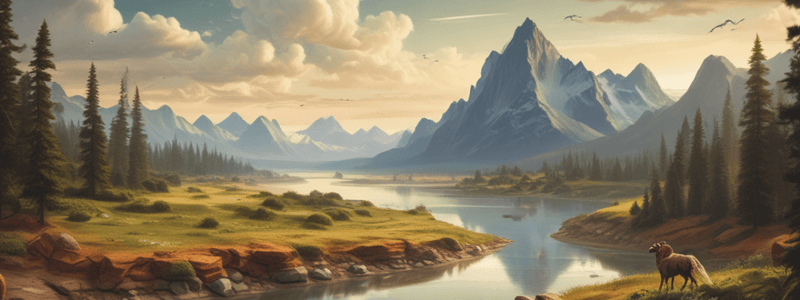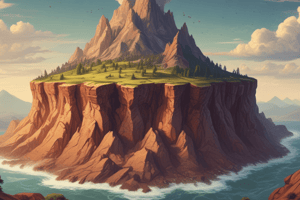Podcast
Questions and Answers
Which of the following is a component of the Earth's interior?
Which of the following is a component of the Earth's interior?
- Seawater
- Glaciers
- Fresh water located in streams
- Asthenosphere (correct)
What is the main focus of historical geology?
What is the main focus of historical geology?
- The study of rock formation and erosion
- The study of plate movements in the geologic past
- The study of fossils and sequences of rock strata (correct)
- The study of groundwater and freshwater resources
Which of the following is the shortest unit of time in the geologic time scale?
Which of the following is the shortest unit of time in the geologic time scale?
- Subepochs (correct)
- Epochs
- Eras
- Eons
What is the key difference between a hypothesis and a theory?
What is the key difference between a hypothesis and a theory?
Which of the following is not a part of the Earth's internal structure?
Which of the following is not a part of the Earth's internal structure?
What is the primary focus of physical geology?
What is the primary focus of physical geology?
Which of the following is NOT one of the four spheres that constitute our environment?
Which of the following is NOT one of the four spheres that constitute our environment?
What is Earth's outermost layer, consisting of the crust and the uppermost mantle, called?
What is Earth's outermost layer, consisting of the crust and the uppermost mantle, called?
Which of the following is not a sphere of the Earth?
Which of the following is not a sphere of the Earth?
Which of Earth's layers are composed of basalt?
Which of Earth's layers are composed of basalt?
Which of Earth's interior layers is responsible for the generation of Earth's magnetic field?
Which of Earth's interior layers is responsible for the generation of Earth's magnetic field?
What is the scientifically accepted age of the Earth?
What is the scientifically accepted age of the Earth?
Which of Earth's layers are composed primarily of iron?
Which of Earth's layers are composed primarily of iron?
Which of the following layers of the Earth's interior has the lowest density?
Which of the following layers of the Earth's interior has the lowest density?
Which elements are commonly found in dark silicate minerals?
Which elements are commonly found in dark silicate minerals?
What is the typical color of the mineral Olivine?
What is the typical color of the mineral Olivine?
Which type of chemical bonding involves the sharing of electrons?
Which type of chemical bonding involves the sharing of electrons?
What is the term for a mineral that allows light to pass through it?
What is the term for a mineral that allows light to pass through it?
Which of the following is the correct order of coal grades from lowest to highest?
Which of the following is the correct order of coal grades from lowest to highest?
What two types of metamorphic rocks are composed primarily of single minerals?
What two types of metamorphic rocks are composed primarily of single minerals?
What is the process of breaking down materials by physical forces into smaller pieces?
What is the process of breaking down materials by physical forces into smaller pieces?
Which of the following minerals is typically found in continental igneous rocks?
Which of the following minerals is typically found in continental igneous rocks?
What is the process by which magma of different compositions combines to form a new magma?
What is the process by which magma of different compositions combines to form a new magma?
Which type of rock is typically formed as silica-rich lava is quenched?
Which type of rock is typically formed as silica-rich lava is quenched?
What is the process by which ions arrange themselves into orderly structures?
What is the process by which ions arrange themselves into orderly structures?
What process involves the complex reorganization of minerals, converting them into new minerals and transforming rocks into stable substances?
What process involves the complex reorganization of minerals, converting them into new minerals and transforming rocks into stable substances?
During metamorphism, what is the major effect of chemically active fluids?
During metamorphism, what is the major effect of chemically active fluids?
What type of rock can change to gneiss through metamorphic activity?
What type of rock can change to gneiss through metamorphic activity?
Which type of rock consists of rounded gravel-sized particles that can be used to determine the source area of the sediments?
Which type of rock consists of rounded gravel-sized particles that can be used to determine the source area of the sediments?
What is the term used to describe a rock with a high percentage of ferromagnesian minerals?
What is the term used to describe a rock with a high percentage of ferromagnesian minerals?
What is the soft, porous sedimentary rock made up almost entirely of the hard parts of microscopic marine organisms?
What is the soft, porous sedimentary rock made up almost entirely of the hard parts of microscopic marine organisms?
Who established the sequence in which minerals crystallize from magma in the early 1900s?
Who established the sequence in which minerals crystallize from magma in the early 1900s?
What is the term for when minerals recrystallize with a preferred orientation perpendicular to the direction of compressional force?
What is the term for when minerals recrystallize with a preferred orientation perpendicular to the direction of compressional force?
What is the process by which magma cools and solidifies to form an igneous rock?
What is the process by which magma cools and solidifies to form an igneous rock?
What is the term used to describe the process of ions combining to form minerals?
What is the term used to describe the process of ions combining to form minerals?
What is the difference between 'extrusive' and 'intrusive' igneous rocks?
What is the difference between 'extrusive' and 'intrusive' igneous rocks?
What is the primary mechanism of diagenesis?
What is the primary mechanism of diagenesis?
What is the primary difference between mechanical weathering and chemical weathering?
What is the primary difference between mechanical weathering and chemical weathering?
Study Notes
Earth's Spheres
- The four spheres that constitute our environment are atmosphere, hydrosphere, biosphere, and lithosphere
- Eonosphere is not one of the four spheres
Earth's Layers
- Earth's outermost layer is the lithosphere, a relatively cool, rigid shell
- The lithosphere is composed of the crust and the uppermost mantle
- The mantle is not composed of basalt
- The core is composed primarily of iron
Earth's Interior
- The geologic time scale divides Earth's history into different units
- The scientifically accepted age of the Earth is 4.6 billion years old
- The outer core is responsible for the generation of the Earth's magnetic field
- The core has the highest density among the Earth's interior layers
Hydrosphere
- The hydrosphere consists of seawater, freshwater in streams, groundwater, and glaciers
- All of the above are components of the hydrosphere
Physical and Historical Geology
- Historical geology involves the study of rock strata, fossils, and geologic events
- Physical geology includes the study of how rocks form and how erosion shapes the land surface
Geologic Time Scale
- The geologic time scale divides Earth's existence into various units of time
- The longest expanses of time are termed eons
Minerals
- Dark silicate minerals contain iron and magnesium
- Hornblende is a dark silicate mineral that is typically dark green in color, exhibits two cleavage planes at 60° and 120°, and is typically found in continental igneous rocks
Chemical Bonding
- In covalent bonding, electrons are shared between adjacent atoms
Mineral Properties
- If light and images are visible through a mineral, the mineral is said to be translucent
- Obsidian is a dark-colored, glassy igneous rock that is typically formed as silica-rich lava is quenched
Metamorphism
- Metamorphic activity can change sandstone to marble
- Crystallization is the process by which ions lose their mobility and begin to arrange themselves into orderly structures
Igneous Rocks
- Magma is completely or partially molten material inside the Earth, which on cooling solidifies to form an igneous rock
- Mafic rocks have a high percentage of ferromagnesian minerals
Sedimentary Rocks
- Chalk is a soft, porous sedimentary rock made up almost entirely of the hard parts of microscopic marine organisms no larger than the head of a pin
Studying That Suits You
Use AI to generate personalized quizzes and flashcards to suit your learning preferences.
Related Documents
Description
This quiz assesses knowledge of environmental studies and geography, including the Earth's layers and spheres. Test your understanding of the Earth's structure and environment.




